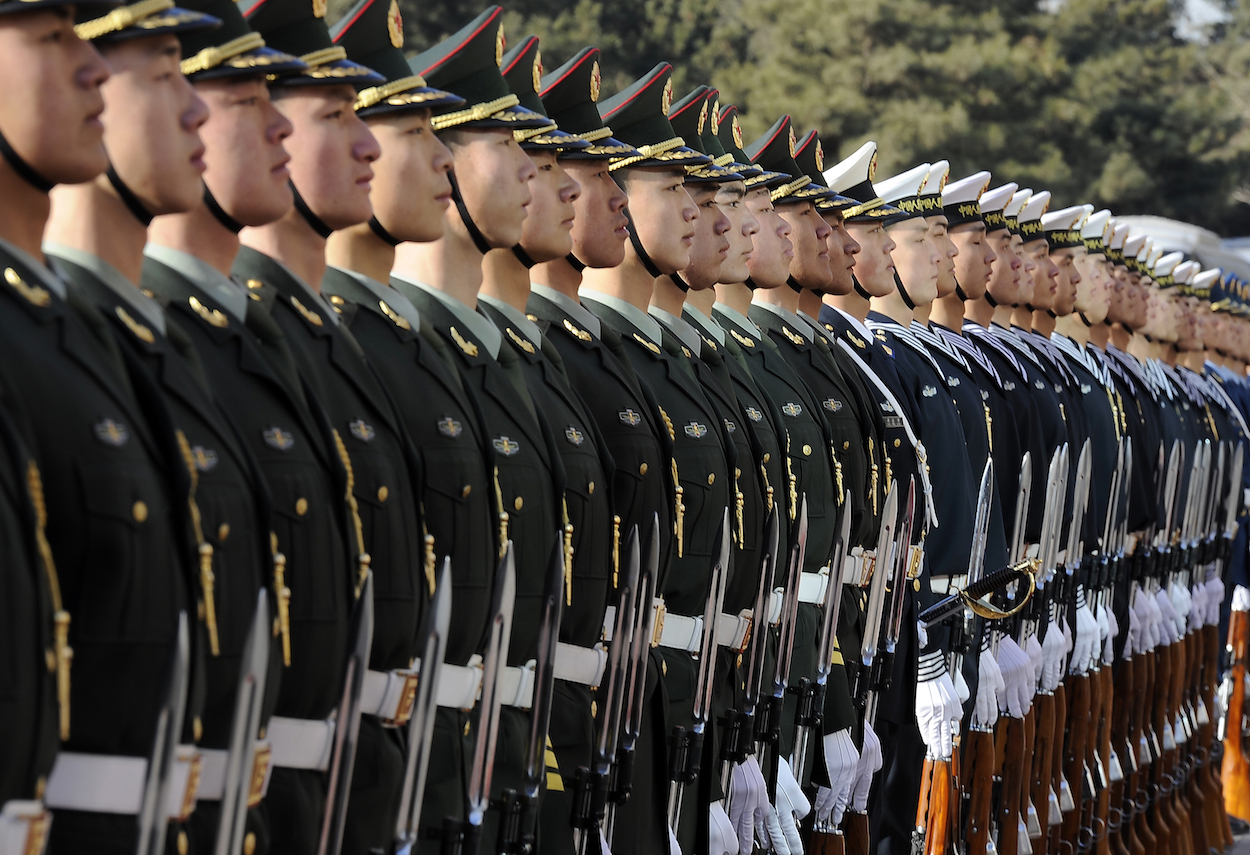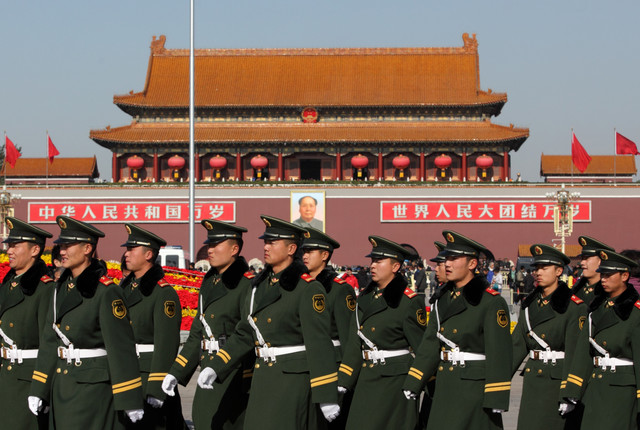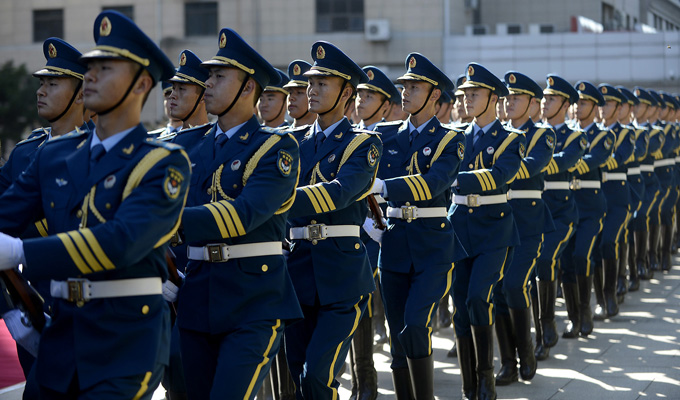by Brian Hioe
語言:
English /// 中文
Photo Credit: Michael Gomez/Public Domain
WILL CHINA be able to invade Taiwan anytime soon? With regards to a recent article by former AP Taiwan correspondent Peter Enav in the Taiwan Sentinel arguing that China could be ready to invade Taiwan as soon as the latter half of 2018 that has become widely discussed in Taiwanese society and recent bluster by China claiming that its military is prepared to go to war defend what it considers its sovereign territory, one should be wary of claims that China will be ready to attack Taiwan so soon.
Bizarre, groundless, and conspiratorial accusations that Enav is helping to intimidate Taiwanese on behalf of the CCP and KMT which have been made by some aside, the impulses behind Enav’s article are quite understandable. Namely, the threat of military invasion from China is one which permanently hangs over Taiwan. Yet while it may be tempting to sound calls about Chinese invasion of Taiwan being just around the corner as a call to action in Taiwan, it is true that this not only inaccurate but reinforces the precise sense of Taiwan being a hopeless cause, as something that can be taken by China at any time. Although not true, this is in fact a perception China hopes to convince the international community of in order to avoid the possibility of foreign intervention which may be deter an invasion of Taiwan, seeing as this will not happen if the world has already labelled Taiwan as indefensible. Such are, in part, the dangers of alarmism, even when this is with the best of intentions in mind.
However, as pointed out correctly by Ray Song in an editorial in the Liberty Times, later translated and published in the Taipei Times, Enav’s claims about China’s military capacity are not completely on the mark. China does not at present have the lift capacity in order to facilitate a full-scale invasion of Taiwan. While Enav is likely aware of this, his warnings that China will be able to launch an invasion of Taiwan by 2018 seems to have as an underlying assumption that resistance from the Taiwanese military will simply not happen, a view which is probably founded on the perception that training in the current Taiwanese military is poor. that the deterioration of the military’s reserve force will lead to insufficient numbers to resist China, and that consequently there will be no will to resist in Taiwan. As such Enav suggests that even a military blockade of Taiwan, without need for a ground invasion, might be sufficient to break Taiwan’s will to resist.
 Photo credit: Master Sgt. Jerry Morrison/Public Domain
Photo credit: Master Sgt. Jerry Morrison/Public Domain
Nevertheless, what is left out of Enav’s argumentation is any discussion of the specific technical challenges China would have to overcome in order to mount a successful invasion of Taiwan. Indeed, there is some reference in Enav’s article to the difficulties in coordinating naval, air, and land forces to launch successful beachhead landings. However, a Chinese invasion of Taiwan would not merely be difficult in coordination, but in fact have to be something on the scale of the D-Day invasion of Normandy during World War II, if not larger, and China would suffer significant losses from beachhead losses during this invasion. Regardless of the poor morale of the Taiwanese military, Taiwanese military hardware is still highly technologically advanced, and this is a deterrent of Chinese invasion, but Enav’s article never goes into the specifics of this, instead largely assuming in an abstract manner that because China is so many times larger than Taiwan, invasion is already possible or will soon be possible and that because political options for unification through China’s proxies in Taiwan, the KMT, are closed off, moving to military force will quickly be the next step for China.
Perhaps, then, part of this misunderstanding returns to the fact that Taiwan experts sometimes are not China experts, inclusive of Taiwanese themselves, never mind that China is simultaneously Taiwan’s closest neighbor and greatest threat. As a threat looming across the Taiwan Straits, China simply presents itself as a homogeneous and uniform, authoritarian and terrifying “other,” and the fact that China is so many times larger than Taiwan and has a repressive regime domestically leads to abstract and fuzzy understanding of China’s actual capacities relative to Taiwan. For example, Enav assumes that China will move towards resolving the Taiwan question after Xi Jinping consolidates his power at the 19th Congress of the Chinese Communist Party later this year. Certainly, Xi looks set to emerge from the Congress stronger than ever, given that there are no significant threats to his power within the CCP at present.
However, what is left out of the picture entirely are the Chinese people themselves, without the passive support of which the CCP cannot maintain its legitimacy as the rulers of China, as well as the present state of Chinese society. With a slowing pace of economic growth, environmental pollution seeming to be ever-present, and widespread corruption in government, one has the suspicion that the present anti-corruption campaign in China is not only intended to remove Xi’s potential rivals for power but also to distract from the failings of the CCP as China’s leaders. While it is true that fanning up the flames of nationalism through a popular foreign intervention could be a means of using nationalism to distract from problems domestically, an invasion of Taiwan would lead to costly loss of Chinese life. To begin with, the last time China fought a war outside its borders was in 1979, and the present China shaped by Deng era economic reforms and social shifts is decidedly very different from China in 1979, a mere three years after the death of Mao. But given China’s current problems domestically, could the CCP handle the crisis of legitimacy from enormous loss of young life in an invasion of Taiwan, and then costly resources and possible further loss of life spent on occupying Taiwan afterwards?
One need only think of the crisis of legitimacy and public anger that western government have faced from troop deaths following participation in the War on Terror, and realize that this would be many times worse for China. As of statistics released in August 2017, American troop deaths in Iraq from the invasion of Iraq are 4,424 servicemen and troop deaths from the War in Afghanistan are 2,350 servicemen. Given the inherent challenges of beachhead invasions, China’s casualties would infinitely higher. Indeed, American estimates of the loss of life from a hypothetical naval invasion of Kuwait in 1991 during the first Gulf War are rumored to be upwards of 10,000, this despite the vast asymmetry in military technology between America and Iraq, a gap which is far closer between Taiwan and China.
As for what would happen following a successful Chinese invasion and subsequent Chinese occupation, even if it is open question as to whether there would be organized armed resistance from Taiwanese, terrorist attacks would almost certainly happen (One does well to remember that terrorist attacks took place against the KMT during the White Terror period, something left out of most narratives of the “peaceful” democratic transition in Taiwan). Terrorist attacks, even when they do not fundamentally disrupt the means of an occupier to maintain an occupation force in any way, sap morale and lead to an inability of occupiers to maintain an occupation, as we can see in the eventual American troop withdrawals from Iraq and Afghanistan, or China’s difficulties in holding Xinjiang and Tibet in check. In that light, Xinjiang, Tibet, and Hong Kong already on its plate, does China really need to have Taiwan on its plate as well?
 Photo credit: Times Asi/Flickr/CC
Photo credit: Times Asi/Flickr/CC
Lastly, as mentioned already with regards to the assumption that the Taiwanese military would not launch a resistance of any significance, Enav’s scenario of a Chinese invasion of Taiwan also strangely leaves Taiwan out in terms of the regional effect that conquest of Taiwan by China would have. Enav largely assumes that because it has become a question whether American would intervene on behalf of Taiwan in the case of a potential Chinese invasion under the presidency of Donald Trump, all obstacles are out of the way for a Chinese invasion, a view largely founded upon the perception that America is Taiwan’s only guarantor of invasion from China.
But there are, of course, other factors. Given China’s current precarious economic status, military invasion by China already has the potential to destabilize China’s own economy, which could be dangerous to China. This is even without factoring in the fact that Taiwan, too, is a large regional economy in the Asia-Pacific and that a destabilized Taiwanese economy, as would occur in the event of a Chinese invasion, would lead to an economic crisis in the region on its own.
For example, if we consider the global effects of the European debt crisis, caused by anxieties of a possible Greek exit from the EU, we may note that Greece has a population of 10.7 million people, making it the 83rd most populated country in the world, and had a GDP in 2015 of $281.6 billion USD, making it the country with the 56th largest GDP in the world. If a Greek economic crisis could affect the global economy writ large, we may note that Taiwan has a larger population and a larger GDP. Out of the world’s 200 or so countries, Taiwan has the 54th largest population and the 21st largest GDP in 2015.
With a population of 1.3 billion to Taiwan’s 23 million, China has a population approximately fifty-six times larger than that of Taiwan. With a GDP in 2015 of $19.51 trillion USD to Taiwan’s $1.114 trillion, China had a GDP in 2015 which is 17.5 times larger than that of Taiwan. But that does not mean Taiwan’s existence is hardly substantial in relation to China, nor that effects on Taiwan do not stand to substantially disrupt the region.
China no doubt realizes this fact about Taiwan. In particular, seeing as the Chinese and Taiwanese economies are deeply interlinked—a connection which goes both way and is not simply a one-way dependence of Taiwan on China, as China would like individuals to believe. An invasion of Taiwan has the possibility of sending both the Taiwanese and Chinese economies, and in turn, the Asia-Pacific economy writ large into crisis, something the CCP quite simply could not handle right now given the already slowing Chinese economy. If economic dissatisfaction with the CCP were to become widespread in China following this economic crisis caused by an invasion of Taiwan, in fact, would be a scenario which could lead to the CCP losing its political legitimacy as the ruler of China.
 Photo credit: Scott M. Ash/Public Domain
Photo credit: Scott M. Ash/Public Domain
Enav assumes that apart from America, no other countries in the Asia-Pacific will intervene on behalf of Taiwan, although Japan might push back against China in some form. While this is true and one cannot bank on any country intervening on behalf of Taiwan in the case of Chinese invasion, Japan, South Korea, and all other Asia-Pacific countries would be on edge after a Chinese invasion of Taiwan, with the fear that they will be next, and the odds of war are high. One has to remember, for example, that Okinawa is actually geographically closer to Taiwan than it is to Japan, and China has at times indicated ambitions on Okinawa. Joint Chinese-Japan polling between Japanese NGO Genron and China Daily indicates that the 53% of the Chinese population believes war to be inevitable between Japan and China while this is believed by 29% of Japanese respondents. Of course, the odds of war are that much higher following an invasion of Taiwan when China and Japan are already at odds over territorial disputes over South China Seas islands, not only because of the rich resources which may be present in those islands, but because both sides see the islands as parts of their integral territory which must be defended in a manner charged with nationalism.
And so if China could take Taiwan, would it be ready to also fend off Japan and to fight a full-scale war in a timeframe not too long after? If not, it would be highly unwise of China to invade Taiwan until it has consolidated its military forces in the Asia-Pacific to the level that it could defeat Taiwan, shrugging off any substantial loss of life that occurs in the process of doing so, maintain an military occupation of Taiwan, and shortly thereafter, militarily fight off Japan and other possible Asia-Pacific challenges at the same time, never mind that this would lead to even further loss of life. It would be irrational of China to invade Taiwan otherwise. This is true even if China attempts a decapitation strike on Taiwan as a means to cripple organized resistance against invasion from the get-go, a dangerous possibility which is not actually mentioned at all in Enav’s article, but should be seriously considered with regard to any military invasion of China.
Indeed, as Ray Song also points out in his editorial in the Liberty Times, much of this returns to that when it comes to dealing with the possibility of an invasion of Taiwan by China, one has to evaluate economic factors, political factors, the state of the military, foreign relations, all at once. And so, perhaps this is what is needed in evaluating the possibility of Chinese invasion of Taiwan. Greater knowledge of China, in all aspects, is required for more accurate assessments on the possibility of Chinese invasion, a question which must be asked from time. But calls to action will need to come from rational assessments founded upon detailed knowledge of China, not alarmism.

